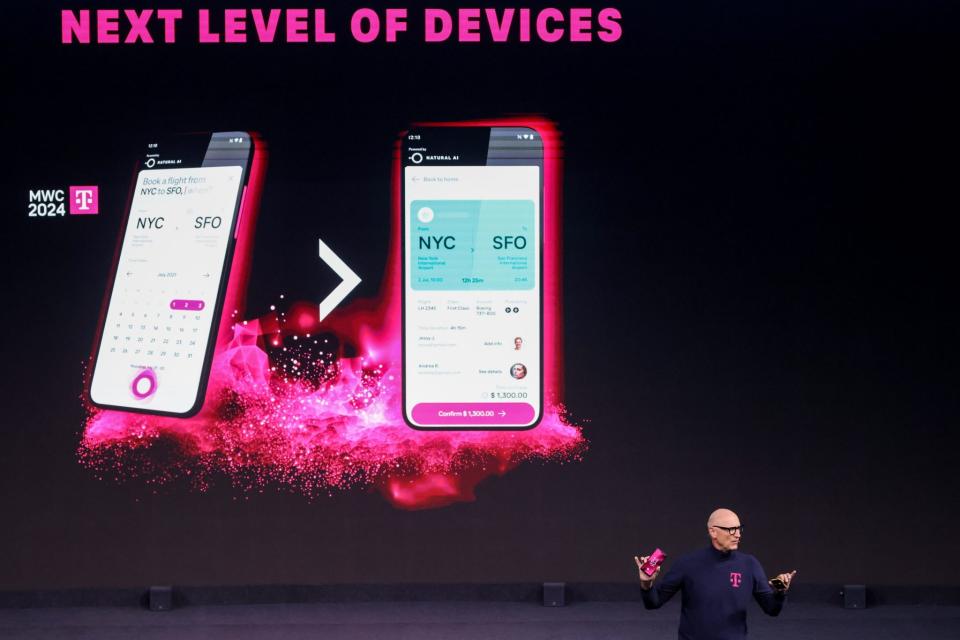Will AI soon kill off the humble app? Don’t bet on it

Did you know that, in the next five to 10 years, none of us will be using apps on our phones anymore? That’s a claim that was made today by Tim Hoettges, CEO of Deutsche Telekom, at the Mobile World Congress in Barcelona.
May I respectfully disagree.
Hoettges made the comment while talking up DT’s “T-phone” concept, a phone that uses an AI concierge as its interface. Powered by Brain.ai’s AI interface tech and with the processing taking place in the cloud, it will book trips for you, buy things for you, and communicate with others on your behalf (the mobile network operator also showed off a smartphone with a Qualcomm processor that will be able to do the processing locally).
It’s certainly plausible that this sort of interface will soon become the norm, though I’d be surprised if it’s operators such as DT that will be seeing the biggest uptake. Far likelier is that people will be using the AI assistants that are baked into their phones by device manufacturers like Apple, Google, or Samsung, or offered by other giants such as Microsoft/OpenAI. This feels like an echo of the operators’ past efforts to be the go-to destination for modern messaging or mobile entertainment—anything but a mere provider of connectivity. Those efforts have generally failed.
But on a broader level, I still don’t think apps will all be killed off.
Some will if all they do is help you execute a certain task, like booking a trip. I’m all for having an assistant relieve me of that tedium—though only if it really works for me, rather than being a friendly face on some corporate effort. As I’ve mentioned before, I do not trust the idea of a cloud-based virtual assistant that acts as my agent, and would much rather have a local AI, with proven and guaranteed privacy and security, cautiously handling my data as it interfaces with online services.
But not all apps are so prosaic. Some are destinations in themselves, for different reasons. For example, I find it fun to browse through my local classifieds app (Kleinanzeigen, previously owned by eBay) for musical equipment that people around Berlin, where I live, are selling. Sure, I could have my assistant looking out for certain items that people may list, so I get a heads-up as quickly as possible, but sometimes I just want to browse, in the hope of finding something I didn’t know I wanted. Much the same can be said for YouTube or for social networking apps.
Also, staying in the musical domain, I recently bought a fantastic Marshall-style amp-in-a-box guitar-effects pedal from Universal Audio (the Lion, in case you’re wondering) that offloads much of its functionality to an accompanying smartphone app, in order to keep the pedal’s hardware interface relatively straightforward. I go to the app to save and retrieve certain combinations of settings—which an assistant could do for me—but also to have fun fiddling around with obscure settings that make a marked difference to the sound. Again, the app is the destination, even if that means I spend a little too much time tone-chasing when I should be writing music instead.
So sure, I think we’ll be using apps less, within Hoettges’s stated time frame. But it doesn’t make sense to say apps will become a thing of the past, at least not so quickly. Many apps will have to adapt to survive, probably with AI-enabled features, but those that promise depth and serendipity—things you don’t want to have automated away—have a good shot at sticking around in some form. I also wouldn’t be entrusting my encrypted messaging to a cloud-based AI anytime soon. More news below.
David Meyer
Want to send thoughts or suggestions to Data Sheet? Drop a line here.
This story was originally featured on Fortune.com

 Yahoo Finance
Yahoo Finance 